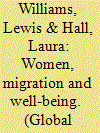|
|
|
Sort Order |
|
|
|
Items / Page
|
|
|
|
|
|
|
| Srl | Item |
| 1 |
ID:
152732


|
|
|
|
|
| Summary/Abstract |
This article engages in an experiment that aims to push critical/post-structuralist thought beyond its comfort zone. Despite its commitment to critiquing modern, liberal ontologies, the article claims that these same ontologies are often tacitly reproduced, resulting in a failure to grasp contemporary structures and histories of violence and domination. The article brings into conversation five selected critical scholars from a range of theoretical approaches and disciplines who explore the potential of the notion of “fracture” for that purpose. The conversation revolves around political struggles at various sites—migrant struggles in Europe, decolonial struggles in Mexico, workers and peasant struggles in Colombia—in order to pinpoint how these struggles “fracture” or “crack” modern political frames in ways that neither reproduce them, nor lead to mere moments of disruption in otherwise smoothly functioning governmental regimes. Nor does such “fracturing” entail the constructing of a “complete” or “coherent” vision of a politics to come. Instead, we detail the incoherent, tentative, and multiple character of frames and practices of thought in struggle that nevertheless produce an (albeit open and contested) “whole.”
|
|
|
|
|
|
|
|
|
|
|
|
|
|
|
|
| 2 |
ID:
131348


|
|
|
|
|
| Publication |
2014.
|
| Summary/Abstract |
Today, the less desirable fruits of the Western growth paradigm are readily apparent as we are confronted with significant threats to our collective well-being. Such threats include: environmental degradation, increasing health, wealth and power disparities, forced migrations and on-going violent conflicts between groups. These problems have been recognized as interrelated with the same root cause: the almost total dominance of the particular assumptions, worldview and social practices of the modern paradigm.2 Correspondingly, it is increasingly argued that human security and well-being are closely connected to linking social and ecological resilience through the re-integration of onto-epistemologies3 of deep interconnectedness into human progress and well-being narratives, worldviews closely associated with Indigenous and other traditional peoples.4 Paradoxically, it is these same peoples, particularly impoverished women and children, who have often borne the brunt of the modernist development paradigm. Whether through inter-racial and ethnic conflict, or for environmental or economic reasons, these seemingly disparate communities are often similarly positioned at the margins of society as a result of forced migration, ensuing cultural dislocation and resulting psycho-spiritual distress.
|
|
|
|
|
|
|
|
|
|
|
|
|
|
|
|
|
|
|
|
|